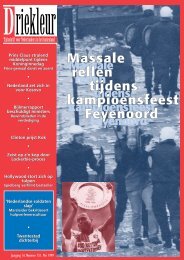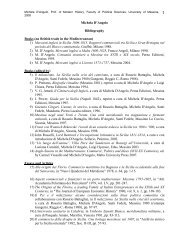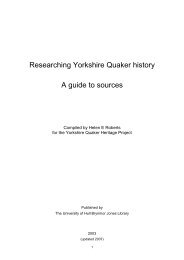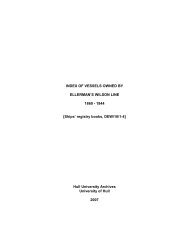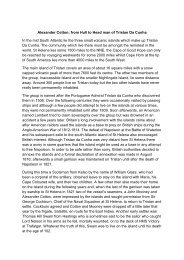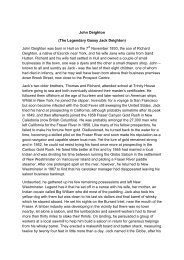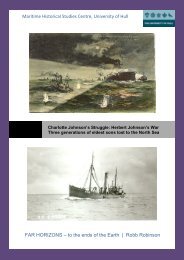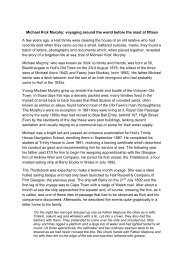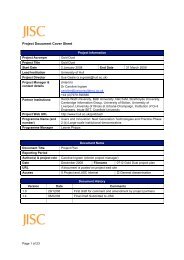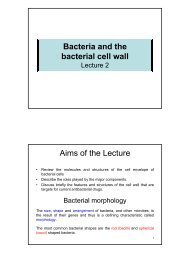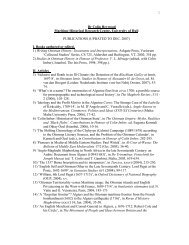The North Atlantic Fisheries, 1100-1976 - University of Hull
The North Atlantic Fisheries, 1100-1976 - University of Hull
The North Atlantic Fisheries, 1100-1976 - University of Hull
You also want an ePaper? Increase the reach of your titles
YUMPU automatically turns print PDFs into web optimized ePapers that Google loves.
<strong>The</strong> Infrastructure for Research on the History <strong>of</strong> Dutch <strong>Fisheries</strong><br />
<strong>The</strong> history <strong>of</strong> the Dutch fisheries is many-sided indeed and <strong>of</strong>fers<br />
several lines <strong>of</strong> approach for research. However, it is still partly a<br />
neglected field <strong>of</strong> research and no immediate change in that situation is<br />
expected. Only one long-term research project is in progress, at the<br />
<strong>University</strong> <strong>of</strong> Groningen, on the catch and trade <strong>of</strong> cod by the Dutch.<br />
Some aspects <strong>of</strong> fishing history are taught in the maritime history courses<br />
at the <strong>University</strong> <strong>of</strong> Leiden. A few students have written M.A. theses on<br />
the history <strong>of</strong> fishing. No more than three Ph.D. theses in this field have<br />
been defended over the past ten years. Funds and opportunities for<br />
further research are not available. In government research institutes for<br />
modern fisheries, hardly any inkling exists <strong>of</strong> the value that historic<br />
research can have for illuminating present-day and future problems.<br />
Apart from source material in state and municipal archives, good<br />
research facilities are provided by the library in the Fishery Museum at<br />
Vlaardingen. A number <strong>of</strong> thematic exhibitions in this museum in the<br />
early 1980s boosted related research. However, subsequent budgetary<br />
problems have drastically curtailed the operations <strong>of</strong> this museum. <strong>The</strong><br />
Fishery Museum has national pretentions, but other fishery museums are<br />
locally orientated, and some are more in the nature <strong>of</strong> an antiquities’<br />
room.<br />
It is evident, and the same goes for other fields <strong>of</strong> maritime history,<br />
that research on narrow aspects <strong>of</strong> fishing history is mainly done by<br />
non-pr<strong>of</strong>essional historians and individual historians. That happens on<br />
an irregular basis and ought to be supported as strongly as possible. A<br />
promising initiative was launched last year: a cash prize for the best<br />
study <strong>of</strong> the history <strong>of</strong> fishing. A new journal, called Netwerk, edited by<br />
the friends <strong>of</strong> the Fishery Museum includes short articles.<br />
An Historiography<br />
In the early 1870s the study <strong>of</strong> maritime aspects <strong>of</strong> Dutch history was<br />
encouraged by competitions held by learned societies which resulted in<br />
two excellent books on the early history <strong>of</strong> whaling and the fishing<br />
industry. <strong>The</strong> prize winners were a young lawyer, later archivist, S.<br />
Muller Fzn, and an economist, later a pr<strong>of</strong>essor, A. Beaujon. <strong>The</strong> latter’s<br />
book covers exactly the theme <strong>of</strong> the contest: “the history <strong>of</strong> Dutch<br />
seafisheries, their progress, decline and revival, especially in connection<br />
with the legislation on fisheries in earlier and later times”. An<br />
international exhibition on fisheries at London in 1883 was the reason for<br />
107



